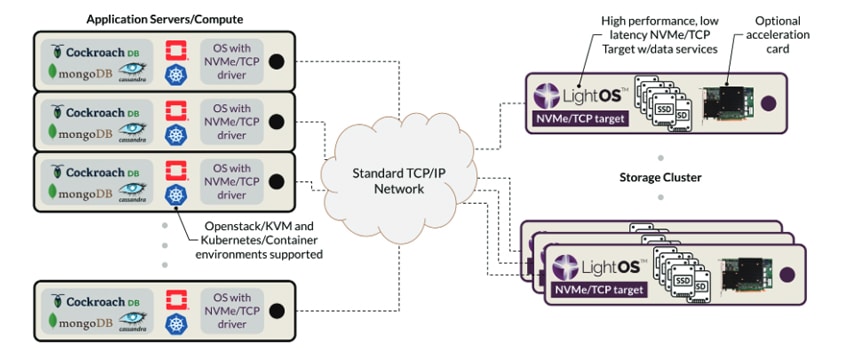Lightbits Labs is rolling out the newest version of its OS, Lightbits Labs LightOS 2.0. The company states that the new version enables cloud-native persistent storage integration for Kubernetes with unprecedented scaling and availability via clustering. Lightbits goes on to say that containerized applications can enjoy reliable disaggregated storage that performs like local flash.
Lightbits Labs is rolling out the newest version of its OS, Lightbits Labs LightOS 2.0. The company states that the new version enables cloud-native persistent storage integration for Kubernetes with unprecedented scaling and availability via clustering. Lightbits goes on to say that containerized applications can enjoy reliable disaggregated storage that performs like local flash.
Lightbits Labs LightOS 2.0 looks to improve over the last version everywhere it can. LightOS 2.0 enables the independent scaling of compute and storage. Other storage innovations include the creation of virtual NVMe volumes for low latency, high performance, as well as the ability to provide high availability via seamless target-side storage server failover. On the container side of things, 2.0 leverages a CSI plugin for Kubernetes to support stateful container storage needs. Kubernetes need large-scale clusters with persistent and durable storage for rapid node migration, workload rebalancing, or recovery from failure without copying data over the network. All of which makes LightOS 2.0 all the more appealing.
LightOS 2.0 is said to automatically optimized for I/O intensive compute clusters (think Kafka, Cassandra, MySQL, MongoDB, and time series database) when it is installed on commodity servers. Each server can support 64k namespaces and 16k connections.
LightOS 2.0 provides the following benefits:
- Software-defined disaggregated storage for cloud data centers delivering direct-attached NVMe SSD performance and up to a 50% reduction in tail latency
- Optimized for low-cost QLC flash: Extends write endurance of drives and improves write performance without the need to modify applications
- Fast container migration via CSI persistent and durable storage
- Standards-based NVMe/TCP block storage access protocol for application-server-to-storage-server communication
- LightOS clusters leverage standard NVMe-oF 1.1 multipathing with data protection on the storage target side, providing transparency to the client with fast failover
- Distributed and durable cluster management with fast failover handling
- No single point of failure in data and control paths
- Multiple LightOS clusters can exist in the same cloud data center and clients can use multiple clusters simultaneously
- Support for Kubernetes v1.13 and v1.15 – v1.18 and later for any volume size, number of volumes or Kubernetes size cluster
- Rolling upgrades allow for LightOS updates without disruption to storage clients
- Target-side solution that is easy to deploy at scale, without having to touch the network infrastructure or the clients
- In cases where Kubernetes is integrated with the OpenStack platform, LightOS 2.0 allows for stateful containers through Kubernetes via CSI, or via a Cinder plugin
Engage with StorageReview
Newsletter | YouTube | Podcast iTunes/Spotify | Instagram | Twitter | Facebook | RSS Feed

